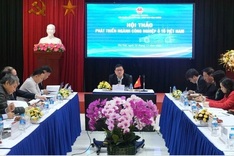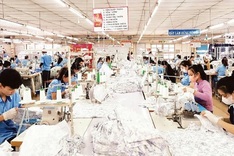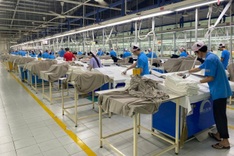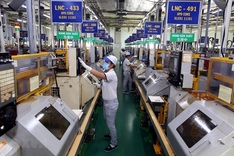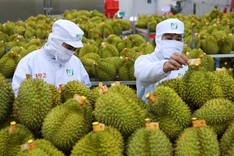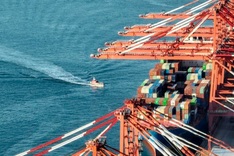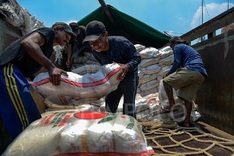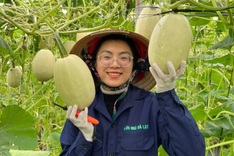
Workers process food for export to Japan. (Photo: VNA)
Vietnam’s export of agricultural products will continue facing many challenges due to changes in countries, according to experts.
Deputy Minister of Agriculture and Rural Development Phung Duc Tien said that the five major challenges for Vietnam's agricultural export are rising input costs, high transport and logistics expenses, constantly changing import policies in other countries, and the fluctuation of bank interest rates.
Producers are required to not only meet production criteria but also comply with increasingly stringent quality standards. Additionally, foreign consumers are tightening their spending due to inflationary pressures, Tien said.
In the fisheries sector, Vietnam is working to lift the EU's "yellow card" regarding illegal, unreported, and unregulated (IUU) fishing to facilitate the export of its fishing products.
Agricultural expert Hoang Trong Thuy said that climate change poses significant challenges to aquaculture industry in Vietnam. The country's infrastructure for aquaculture has not developed sufficiently to meet industry demands, and the quality of aquatic seedlings needs improvement to ensure high-quality products that satisfy consumer requirements.
Meanwhile, Director of the Vietnam Chamber of Commerce and Industry (VCCI) in HCM City Tran Ngoc Liem said that timber processing and export sector in Vietnam also faced challenges in 2024. Notably, demand in major markets such as the US and Europe has significantly decreased due to economic recession and rising inflation, leading to tighter consumer spending. The number of orders from these markets have dropped substantially, impacting the timber industry.
At the same time, stricter requirements on timber origin and sustainable production are putting further pressure on Vietnamese exporters.
In the US, Vietnamese timber companies are facing the possibility of anti-dumping investigations, especially concerning products sourced from third countries like China. Such investigations could result in high tariff penalties if violations are found, threatening the competitiveness of Vietnamese companies in the US market.
However, Liem said there are opportunities for Vietnamese exporters in other markets thanks to signed free trade agreements, recovering demand in China and upcoming festive seasons at the end of the year in Europe, Japan and the Republic of Korea. According to To Thi Tuong Lan, Deputy Secretary General of the Vietnam Association of Seafood Exporters and Producers (VASEP), responding to consumer demands and technical barriers from importing countries, Vietnamese seafood processors and exporters are investing in technology to enhance production capacity.
For instance, Vietnamese seafood faces technical barriers like anti-dumping tariffs and the IUU yellow card, but new opportunities arise from the growing demand in the Halal market, prompting seafood companies to invest accordingly.
Moreover, they are making efforts to meet requirements regarding green production and environmental protection.
Deputy Minister Tien emphasised that applying high technology in agricultural production is crucial for enhancing the efficiency and sustainability of the agricultural value chain.
He said that sustainable agricultural development must go hand in hand with environmental protection and the responsible use of natural resources.
Measures such as using organic fertilisers and pesticides, managing water resources effectively and protecting soil and biodiversity should be widely adopted to increase the competitiveness of Vietnamese agricultural products, he noted.



